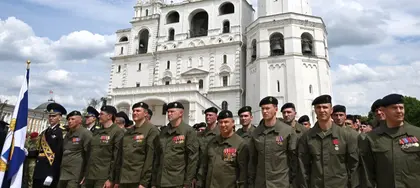Росгвардия отвечала за защиту акватории Керченского моста с момента строительства. И у них даже был "Кальмар" с противодиверсионным гранатометом.
— в акациях, солнечный город (@BCatAndBCoffee) July 18, 2023
2019 год. "Комсомольская правда" pic.twitter.com/xPq3v7jH4M
Russian lawmakers passed a bill on Wednesday, July 19, that would allow its National Guard to deploy heavy weapons – including tanks – on the streets of the country in the wake of the short-lived insurrection by the mercenary group Wagner.
Since it was formed in 2016 its original role, as a means of controlling and stopping public demonstrations has since taken on a broader role including, participation in Moscow's full-scale war on Ukraine launched in February last year.
JOIN US ON TELEGRAM
Follow our coverage of the war on the @Kyivpost_official.
According to the legislation passed by parliament's lower house, the force, which answers directly to Putin, will be able to be armed with military-grade weapons, including heavy weapons.
The bill was approved after the Russian defence ministry said it had taken possession of military hardware from Wagner mercenaries following their aborted uprising last month.
The legislation comes as the Kremlin seeks to bolster its security apparatus in response to the mutiny instigated by the chief of the Wagner PMC, Yevgeny Prigozhin in an attempt to topple the country's top military command.
While the bill still has to be approved by the upper chamber and approved by Putin, these are steps that are considered to be a formality.
Russians began commenting on the recent legislation, saying that instead of passionately guarding the Kremlin's Chief, the National Guard should have been more diligent in carrying out their existing duty, such as in guarding the Crimea Bridge, which has been attacked by Ukraine twice since the start of the war.

‘Espionage Is a Constant Threat’ – EU Proposes Fresh Sanctions on Russia, Warns of Orbital Dangers
"The Russian Guard was responsible for protecting the waters of the Kerch Bridge from the moment of construction. And they even had a "Squid" with an anti-sabotage grenade launcher."

"The authorities are reacting with convulsive actions. The fact that this decision was made after Prigozhin's rebellion only confirms this notion: there is a minimum of rationality in it, only a fear of losing power."

"As recent events have shown, no one is eager to defend the government. The National Guard were the only one who rushed in, so that's why they were generously rewarded."

"It is logical. Otherwise, they were not adapted to a special military operation or to the suppression of the rebellion."
Some commentators, however, found this move to be quite reasonable.
 "Hmm, are you the military expert for sure? Moscow is still the biggest railway and distribution centre. If you create chaos in Moscow (or capture Moscow), the logistics of the western part of the country will be cut off from the rest."
"Hmm, are you the military expert for sure? Moscow is still the biggest railway and distribution centre. If you create chaos in Moscow (or capture Moscow), the logistics of the western part of the country will be cut off from the rest."
The head of the National Guard, Victor Zolotov, first suggested his units would receive heavy weapons on June 27, three days after the failed mutiny.
"This issue is very acute now. We don't have tanks and other heavy weapons. We will supply the troops with this equipment," he said, adding that this issue has already been discussed with Putin.
According to Zolotov, the timing to receive such equipment would depend on the availability of funding.
Prigozhin’s mutiny began on June 23 and was declared as a “march of justice” aimed at removing Russian Defense Minister Sergei Shoigu and Chief of the General Staff, Valery Gerasimov, from their positions.
Over the course of a day, the mercenaries seized control of Rostov-on-Don and traveled through several Russian regions, shooting down six Russian army helicopters and one plane on the way.
However, shortly before reaching Moscow, Prigozhin abruptly altered his course following negotiations with Belarussian President Alexander Lukashenko.
In line with the resulting agreement, Wagner PMC troops were ordered to return to their field camps, and all charges against Prigozhin were dropped, facilitating his relocation to Belarus.
You can also highlight the text and press Ctrl + Enter










